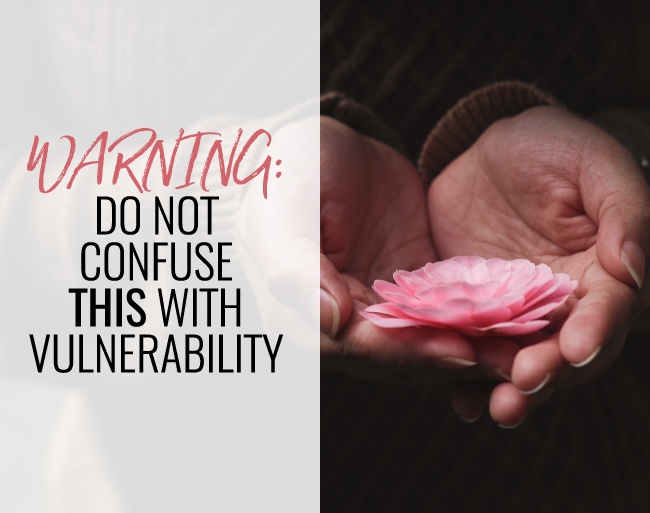What does it mean to be vulnerable in a healthy way?
Vulnerability is, without a doubt, one of the keys to creating and sustaining deeply meaningful relationships and being known in a real way.
If that doesn’t make you feel like you need to hop on the vulnerability train, let me underscore it further for you: there is an overwhelming amount of sociological (shout out to Brene Brown) and psychological data that proves that those who practice healthy vulnerability live happier, more joy-filled lives. Period.
All that said, I think there is still an important piece of the vulnerability conversation missing, and that’s why this week I’m throwing in my two cents because…not all “vulnerability” is created equal.
In this episode, I’m sharing what you might be confusing for vulnerability and steps you can start to take today to shift into the kind of healthy vulnerability that becomes the foundation for authentic, wholehearted relationships. I also discuss this in my video.
In order to embrace and practice being vulnerable in a healthy way, we need to fully understand what it is and what it isn’t.
So what is vulnerability?
Vulnerability is what we feel when we know we’re not perfect, but we’re willing to reveal ourselves anyway. It’s telling the truth about yourself: getting honest about how we really feel and what we really want, believe and need.
Telling our stories and drawing boundaries or saying no in an authentic way can leave us vulnerable to others, so it requires self-acceptance and courage.
Here’s what vulnerability is not:
- It’s not sharing every nuance and every piece of ourselves with just anyone that crosses our path or all over social media.
- It’s also not protecting ourselves so fiercely that we wake up one day and realize that no one knows who we really are.
I’ve discovered over the past two decades while teaching women all over the world the power of boundaries, that there’s commonly a knee-jerk reaction or a habituated response to creating intimacy and building relationships that usually goes one of two ways: oversharing or undersharing.
When we undershare, we are too avoidant. If you are an undersharer, you don’t want to make yourself too accessible, and in a lot of ways, that’s understandable. When we make ourselves vulnerable, we allow others to see our most authentic self, and that leaves us open to getting hurt, rejected, made fun of or having someone use what we’ve shared with them in confidence against us.
On the other end of the spectrum, sharing too much, too soon can be a real block to intimacy as well. Have you ever been in a situation with someone you just met and they literally tell you the worst thing that ever happened in their life? How does that make you feel?
It might be you that is the oversharer. You might feel an urgency or compulsion to confess your life story to someone on the first date or someone you just met.
Sometimes when there’s a lot of shame around our past life experiences, we either feel compelled to say nothing about it or to confess all of it right away. In the second instance, your confession could be driven by fear- “If you’re going to reject me, do it now”.
If this resonates, I want you to know that you have a right to your privacy and YOU get to decide with whom and when you share your deepest self.
WARNING: Oversharing is NOT the same as healthy vulnerability.
If you cannot become discerning around what you share and who you share it with, what ends up happening is that your sharing becomes less meaningful because you’re not even attached to WHY you’re sharing with someone.
This is an example of indiscriminate vulnerability. It’s basically like living in a house with no door and that sets you up for disordered boundaries and disappointment.
So how do we strike a balance? The ideal to strive for here is what I call voluntary vulnerability, and that means being consciously, mindfully vulnerable.
It’s you learning to discern and opening up, over time, to those who have proven themselves to be trustworthy. Voluntary vulnerability is, for me, a requirement when it comes to creating and sustaining deep, lasting and vibrant relationships, but there has to be a real mutuality of trust.
When you are in a relationship with trust that’s built over time and experiences together, then choosing to be vulnerable with that person is the thing that truly deepens your intimacy.
It is satisfying to be known. Is it unsatisfying to play a role. So many of us have learned a million different covert and overt ways to avoid vulnerability. In decoding our relationship to being vulnerable, there are cultural and societal narratives to consider, as well as what we learned growing up in our family of origin.
Understanding how capable you are of healthy, voluntary vulnerability starts with uncovering your “Vulnerability Blueprint”, and I’ve created a cheat sheet with some questions to help you get started that you can download right here.
I hope I’ve given you some ideas of how to actually tap into your own power to create authentic, healthy, voluntary vulnerability in your life! If this brought you any aha moments and if you know others who could benefit from this, please share it on your social media platforms.
I would love to keep this conversation going, so drop me a comment, because I always want to hear from you. Thank you for being here with me and for being committed to YOU. I hope you have an amazing week and as always, take care of you.
Terri Cole is a licensed psychotherapist, transformation coach, and an expert at turning fear into freedom. Sign up for Terri’s weekly Newsletter, check out her blog and follow her on Twitter.












